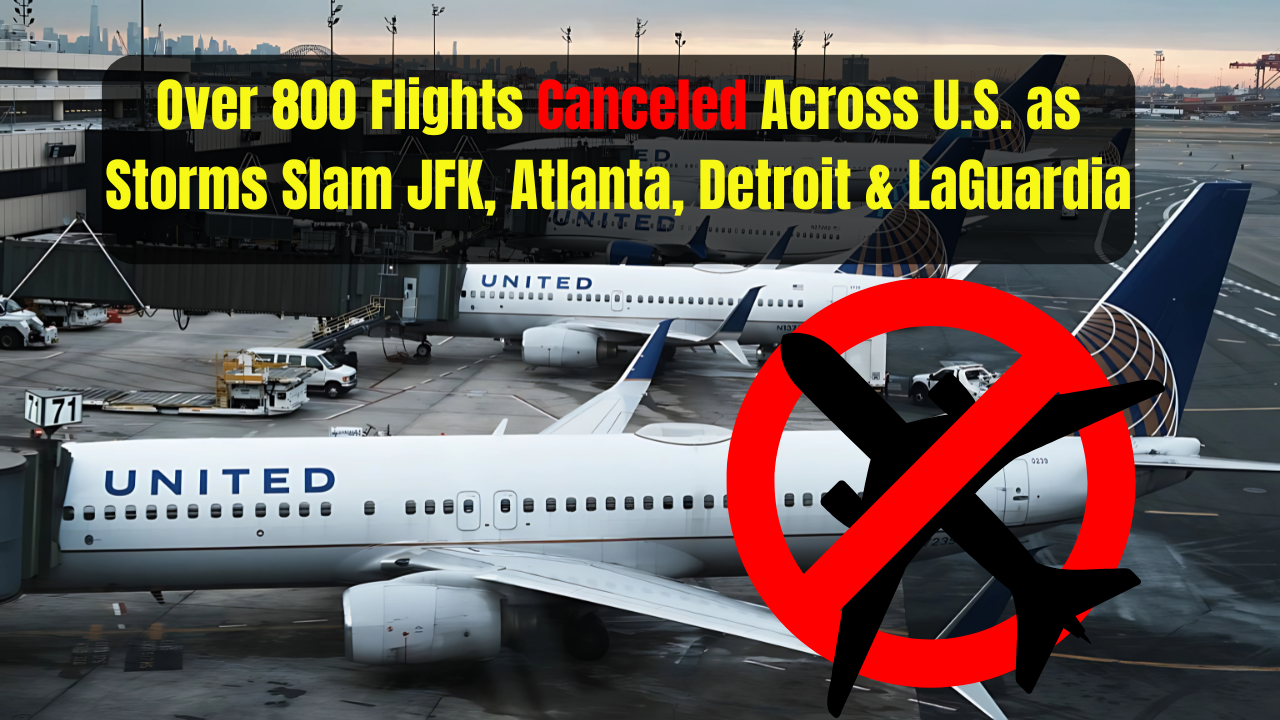As summer travel kicks into high gear, passengers across the United States are facing significant disruptions due to severe weather conditions. Over 800 flights have been delayed or canceled at major airports, including JFK, Atlanta, Detroit, and LaGuardia, leaving thousands of travelers stranded and frustrated. Airlines such as Air Canada, Delta, American, JetBlue, and WestJet are among those most affected by these weather-related disruptions1.
The situation highlights the vulnerability of air travel to unpredictable weather, especially during the busy summer months when thunderstorms, hail, and low cloud cover are common. The ripple effects of these disruptions are felt nationwide, with passengers experiencing delays, missed connections, and uncertainty about their travel plans.
The Human Impact of Flight Disruptions
Behind every delayed or canceled flight is a traveler with a story. Families hoping to start vacations, business professionals heading to important meetings, and students returning home are all caught in the chaos. Airports become crowded, customer service desks are overwhelmed, and the emotional toll on passengers is significant.
One passenger, Sarah from Chicago, shared her experience: “I was supposed to fly to New York for a family reunion, but my flight was canceled due to storms. I spent hours at the airport trying to rebook, and now I’m worried I’ll miss the event altogether.” Stories like Sarah’s are becoming increasingly common as severe weather events become more frequent and intense.
Weather Patterns and Air Travel: A Volatile Relationship
Weather is the leading cause of flight delays and cancellations in the United States, surpassing all other factors such as mechanical issues or staffing shortages. Thunderstorms, hail, and low cloud ceilings can ground planes, force diversions, and cause lengthy delays. The period from mid-June to the end of August is particularly prone to disruptions, as this is when thunderstorms are most prevalent and air travel reaches its peak.
Airports on the East Coast, such as JFK, LaGuardia, and Newark, are especially vulnerable to weather-related delays due to their dense air traffic and proximity to storm systems. Meanwhile, airports in the Midwest and South, including Atlanta and Detroit, also experience frequent disruptions during the summer months.
Airlines and Airports: Responding to the Crisis
Airlines are working around the clock to minimize the impact of weather-related disruptions. Many have issued travel waivers, allowing passengers to rebook without penalty, and are providing updates via their websites and mobile apps. However, the sheer volume of affected flights means that rebooking options are limited, and wait times for customer service can be lengthy.
Airports are also taking steps to assist stranded passengers. Additional staff are being deployed to help with rebooking, and some airports are offering amenities such as food vouchers and overnight accommodations for those who are unable to secure a flight out on the same day.
Top Airlines Affected by Recent Disruptions
The following airlines have reported the highest number of delays and cancellations during the recent weather events:
-
Air Canada
-
Delta
-
American Airlines
-
JetBlue
-
WestJet
These carriers operate a large number of flights at the affected airports and are therefore more likely to experience disruptions when severe weather strikes1.
Major Airports Impacted by Severe Weather
The following airports have been particularly hard hit by the recent weather events:
-
John F. Kennedy International Airport (JFK)
-
Hartsfield-Jackson Atlanta International Airport (ATL)
-
Detroit Metropolitan Wayne County Airport (DTW)
-
LaGuardia Airport (LGA)
These airports are among the busiest in the country and serve as major hubs for both domestic and international travel.
Flight Disruption Statistics: A Closer Look
Recent data from flight tracking services and the Federal Aviation Administration (FAA) show that hundreds of flights have been delayed or canceled due to severe weather. For example, on a recent Friday, more than 800 flights were delayed at Denver International Airport alone, with 24 flights canceled2. Similar disruptions have been reported at other major airports, with delays and cancellations affecting thousands of passengers nationwide.
How to Navigate Flight Delays and Cancellations
For travelers facing flight disruptions, there are several steps you can take to minimize stress and get back on track:
-
Check your flight status regularly: Use airline apps or flight tracking websites to stay updated on your flight’s status.
-
Contact your airline: Reach out to your airline’s customer service for rebooking options and assistance.
-
Consider travel insurance: Travel insurance can provide coverage for unexpected delays and cancellations, especially those caused by weather.
-
Be patient and flexible: Weather-related disruptions are often beyond the control of airlines and airports, so patience and flexibility are key.
The Role of Travel Insurance
Travel insurance can be a lifesaver for passengers affected by flight delays and cancellations. While airlines are not required to provide refunds for weather-related disruptions, travel insurance policies often cover expenses such as hotel accommodations, meals, and transportation. This can provide peace of mind and financial protection for travelers caught in unpredictable situations.
Airport Performance: Delays and Cancellations by the Numbers
To help travelers make informed decisions, here are some key statistics on airport performance in recent years:
| Airport Code | Airport Name | % Flights Delayed (2024) | % Flights Canceled (2024) |
|---|---|---|---|
| SFO | San Francisco International | 29.50 | — |
| EWR | Newark Liberty International | — | 2.63 |
| PBI | Palm Beach International | 24.73 | — |
| FLL | Fort Lauderdale-Hollywood Int’l | 24.22 | — |
| DFW | Dallas/Fort Worth International | 23.65 | — |
| TPA | Tampa International | 23.32 | — |
| MCO | Orlando International | 23.22 | — |
| SAT | San Antonio International | 23.08 | — |
| MIA | Miami International | 22.93 | — |
| OGG | Kahului Airport | 12.20 | — |
Note: Data for cancellations is only shown for EWR, as it had the highest cancellation rate in 2024. Other airports may have lower rates.
Recent Trends in Flight Disruptions
The summer of 2025 has seen a spike in flight delays and cancellations, with severe weather being the primary culprit. According to the FAA, low clouds in the morning and thunderstorms in the afternoon have slowed operations at airports such as Atlanta, Boston, and Denver. These conditions are expected to persist throughout the summer, making it essential for travelers to stay informed and prepared.
What Airlines Are Doing to Help
Airlines are taking proactive steps to assist passengers during weather-related disruptions:
-
Issuing travel waivers: Allowing passengers to rebook without fees.
-
Providing real-time updates: Through apps, websites, and social media.
-
Offering amenities: Such as food vouchers and hotel accommodations for stranded passengers.
Specifications Table: Major Airlines and Airports Affected
| Airline | Major Hubs Affected | % Flights Delayed (Recent) | % Flights Canceled (Recent) |
|---|---|---|---|
| Delta | ATL, JFK, LGA, DTW | High | Moderate |
| American | DFW, JFK, LGA, ORD | High | Moderate |
| Southwest | DEN, ATL, MDW | Very High | High |
| JetBlue | JFK, BOS | Moderate | Low |
| Air Canada | JFK, EWR, YYZ | Moderate | Low |
| WestJet | YYZ, YYC | Low | Low |
Note: Percentages are indicative based on recent weather events and may vary by day and location.12
The Future of Air Travel in Uncertain Weather
As climate change leads to more frequent and intense weather events, the aviation industry faces growing challenges in maintaining on-time performance. Airlines and airports are investing in new technologies and strategies to improve resilience, but the unpredictable nature of weather means that disruptions will likely remain a part of air travel for the foreseeable future.
FAQs
Why are so many flights delayed at US airports?
Severe weather, especially thunderstorms and low cloud cover, is the main cause of flight delays at US airports.
Which airlines are most affected by weather disruptions?
Delta, American, Southwest, JetBlue, and Air Canada are among the airlines most affected by recent weather disruptions.
What should I do if my flight is delayed or canceled?
Check your flight status, contact your airline for rebooking options, and consider travel insurance for additional protection.
Severe weather continues to disrupt air travel across the United States, causing widespread delays and cancellations at major airports. Passengers are advised to stay informed, remain flexible, and consider travel insurance to mitigate the impact of these disruptions. As the summer travel season progresses, airlines and airports will continue to face challenges in managing the effects of unpredictable weather on their operations.

